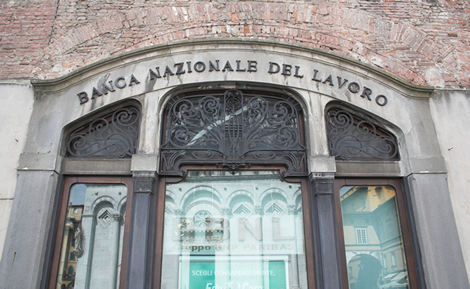 |
| Banco Nazionale del Lavoro |
An Italian bank with alleged conspiracy connections to BCCI (Bank of Credit and Commerce International), the Vatican, George H. W. Bush, the Bank of England, and the Gulf War, Banco Nazionale del Lavoro (BNL) is viewed as partially responsible for funding Saddam Hussein’s military buildup.
BNL, according to the theorists, is partially owned by the Vatican and is also viewed as a source for laundering drug money. In fact, BNL, which is the largest Italian bank in terms of deposits, is 96 percent government owned.
As of 1990, it had more than $100 billion in assets worldwide, and as one of the Italian banks to open offices in Ethiopia during the era of Italian occupation, BNL had important connections in the Arab world. In the United States, BNL had offices in Atlanta, Chicago, Los Angeles, and Miami.
  |
Most of the conspiracy criticism stems from lending made by the Atlanta, Georgia, branch of the BNL—coincidentally the same city in which BCCI conducted its operations—between 1983 and 1990. According to Representative Henry Gonzalez (DTX) of the House Banking Committee, BNL made over $3 billion in unauthorized loans to Saddam Hussein’s Iraq.
In addition, the Reagan–Bush administrations authorized more than $5 billion in loan guarantees to Iraq. Even some of the unauthorized loans, critics claimed, were indirectly supported by the Department of Agriculture. At the time the loans were made, the U.S. government considered Iraq the “lesser of two evils” compared to its archenemy, Iran, and therefore decided it was desirable to prop up the Iraqi dictator.
Still, as Gonzalez charged, BNL was not just another regulatory failure, but was a failure of U.S. foreign policy in that it linked loans to Iraq’s military buildup. (This, of course, was common practice in virtually all administrations—numerous Communist and otherwise hostile states received U.S. aid on a regular basis).
However, critics went further than the standard complaints about giving away money to “America’s enemies.” In 1991, Sherman Skolnick
Actually, it was the government that began the investigation into BNL’s illegal activities, starting with a 1989 “raid” on BNL offices in Atlanta that revealed an “off books” lending operation to Iraq that had been occurring since 1987. These transactions were recorded in separate, secret books that recorded the money laundering as “commodities” financing.
It was through these commodities financing arrangements that the U.S. Department of Agriculture, through the Foreign Agricultural Service, began to make short-term credit guarantees to eligible nations.
Iraq had begun to acquire U.S. commodities under the program in 1983, even before diplomatic relations were fully restored, mainly in an effort by the Reagan administration to provide a barrier to the threat coming from Iran’s jihad. But as soon as Hussein invaded Kuwait, all Iraqi agricultural loans were suspended.
Even critics such as Gonzalez admitted that the fraudulent use of the USDA loan guarantees was not known until after August 1989, at which time investigators found that Iraq had falsified the types of commodities it purchased; overstated the costs (to funnel money into the military); and shifted financing costs onto still other lending programs.
In addition, Iraq worked a “scam” on the Import–Export Bank from 1987 to 1990, skimming off yet another $300 million. Congress, under Rep. Gonzalez, launched an investigation of BNL in 1990. According to Attorney General Richard Thornburgh, the public airing of the details of the cases brought by the U.S. Attorney’s Office “raises the prospect that culpable parties will elude prosecution.”
Using the same language later used by Janet Reno in her many “no-comments” about the campaign finance irregularities of the Clinton–Gore administrations, Thornburgh claimed that congressional interference in “ongoing criminal investigations” would jeopardize the prosecution of guilty individuals.
BNL’s “conspiracy heritage” did not suffer from its connections to Henry Kissinger, whose legal firm represented the bank during the 1980s in international sales and contracts. As an international bank, BNL also had contacts to the Bank of England, the Federal Reserve Board, BCCI, and the collapse of Banco Ambrosiano in Italy in 1982.
The Ambrosiano failure is viewed by some conspiracists as particularly important because it had CIA connections, as well as links to the Mafia, the Masons, and the U.S. Savings and Loan scandal